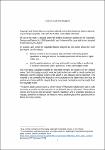Responding to Reading Difficulties: An Exploration from Different Professional Perspectives
| dc.contributor.supervisor | Georgeson, Jan | |
| dc.contributor.author | Unlu, Ezgi | |
| dc.contributor.other | Faculty of Arts and Humanities | en_US |
| dc.date.accessioned | 2024-02-15T10:03:24Z | |
| dc.date.available | 2024-02-15T10:03:24Z | |
| dc.date.issued | 2024 | |
| dc.identifier | 10629860 | en_US |
| dc.identifier.uri | https://pearl.plymouth.ac.uk/handle/10026.1/22054 | |
| dc.description.abstract |
The study was designed to explore educators’ perspectives on reading difficulties and their choice of teaching strategies for students with reading difficulties. The study aimed to understand how educators form their professional perspectives on reading difficulties, how this relates to their understanding of the concept of ‘dyslexia’ and how this informs their teaching methods. Furthermore, the study has explored the extent to which these chosen teaching strategies are inclusive and meet the needs of all students. A qualitative case study was used to generate data to address the research questions and achieve the aims of this study. Data were generated from semi-structured interviews with thirteen educators from different contexts and career stages, classroom observations in two primary schools in England, and a dyslexia training session online. Thematic data analysis was used to interpret the data and identify themes related to the educators’ understanding of the reading difficulty and pedagogy for students with reading difficulty (Braun and Clarke, 2006). Braun and Clarke's six steps were followed for analysing the data. Furthermore, multi-layer analysis (Robbins, 2007) was used to incorporate findings from three aspects of my theoretical framework: Rogoff’s (1995) three planes of analysis, Tobin’s (1999) comparative classroom ethnography, and models of disability. My study suggests that teachers’ understanding of reading difficulties is influenced by different models of disability at different levels of their thinking, which then also influences their choice of teaching strategies to respond to reading difficulties. My study findings also suggest that students with reading difficulties are not given enough opportunities to voice their needs and feelings, and it is recommended that spaces be provided for individuals to reflect and for all stakeholders to talk and share their reflections. In addition, my study recommends that student teachers should be prepared for working with students who have reading difficulties in their future classrooms by developing an understanding and knowledge of inclusive pedagogy and how this relates to teaching children how to read. This can also be extended to teachers who are currently working in schools to develop a better understanding of how to support all children to learn to read. | en_US |
| dc.language.iso | en | |
| dc.publisher | University of Plymouth | |
| dc.subject | Reading difficulty | en_US |
| dc.subject.classification | PhD | en_US |
| dc.title | Responding to Reading Difficulties: An Exploration from Different Professional Perspectives | en_US |
| dc.type | Thesis | |
| plymouth.version | publishable | en_US |
| dc.identifier.doi | http://dx.doi.org/10.24382/5146 | |
| dc.rights.embargoperiod | No embargo | en_US |
| dc.type.qualification | Doctorate | en_US |
| rioxxterms.version | NA |
Files in this item
This item appears in the following Collection(s)
-
01 Research Theses Main Collection
Research Theses Main


